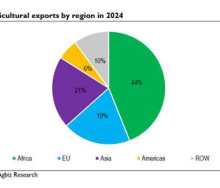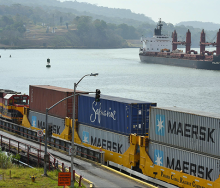A legal matter in the making for more than a decade has finally culminated in a UK court upholding a previous ruling that prevents charterers from limiting an owner's claim for their own losses.
The ruling marks the latest development in litigation that ensued from a fire that engulfed the MSC Flaminia on July 14, 2012.
Three crew died in the mid-Atlantic container vessel fire while the Flaminia was sailing from Charleston in South Carolina, to the Port of Antwerp in Belgium.
According to reports at the time, the fire was caused by an explosion that erupted in one of the ship’s cargo holds, resulting in the destruction of numerous containers and causing substantial damage to the vessel.
In the aftermath of the mid-ocean calamity, it was established that auto-polymerisation of the contents of one or more tank containers caused chemical contents to erupt.
The salvaged ship had to undergo extensive repairs at a substantial cost for its owners, Conti Reederei in Hamburg.
In response to the losses it had incurred, Conti initiated arbitration proceedings against the Flaminia’s charterer, Mediterranean Shipping Company.
Conti’s claims aimed to recover hire payments for the period when the ship was not in service under the charter, as well as compensation for their losses stemming from the casualty.
In an initial ruling dated July 30, 2021, the arbitrators awarded damages amounting to around $200 million in Conti's favour.
But MSC sought to limit its liability for claims arising from the incident, invoking the 1976 Convention on Limitation of Liability for Maritime Claims, as amended by the 1996 Amending Protocol, which has been incorporated into UK law under section 185 of the Merchant Shipping Act 1995.
That is according to a report carried by Splash 247.
The trial regarding the limitation action was presided over by Judge Andrew Baker, who had previously determined that MSC was not entitled to an anti-suit injunction preventing Conti from enforcing its arbitration award elsewhere.
Judge Baker concluded that MSC could not limit its liability because Conti's claims did not fall within the scope of any of the provisions in Article 2 of the convention. Importantly, the judge rejected Conti's argument that tonnage limitation under Article 2(1) only applies to claims concerning losses incurred by parties falling outside the extended definition of 'shipowner' outlined in Article 1(2) of the 1976 convention.
MSC appealed the decision, prompting Conti to submit a narrower argument than the one presented to the lower court. During the appeal, Conti asserted that the claims referenced in Article 2 should be interpreted to exclude claims made by an owner against a charterer seeking to recover losses incurred by the owner itself.
The Court of Appeal ultimately endorsed this narrower submission, resulting in the dismissal of the appeal in the present month, as detailed in the respondent's notice.
Essex Court Chambers released an update stating that this decision is likely to be of considerable interest to all involved in shipping litigation and their insurers. SOURCE: Splash 247













